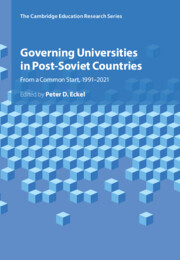Governing Universities in Post-Soviet Countries endorsements
“As the Minister of Science and Higher Education, I can attest to the significance and novelty of this study that captures governance structures in all post-Soviet republics. This is complex and meaningful research that benefits greatly from consistency and its chosen comparative approach. The cases are well crafted, and analysis chapters capture conceptual insights that are often missing in governance literature. I certainly recommend this book to policymakers, researchers, university leaders, and practitioners seeking to deepen their understanding of complexities in governing today’s universities.”
“As a president of universities in two different countries, I know well the impact that board structure has on universities and their governance. This book is not only a thoughtful analysis of university governance in post-Soviet countries, but also a thought-provoking treatise on the evolution and transformation of higher education, which will be impactful for governance boards and university leaders in every state.”
“The conflict between Russia and Ukraine illustrates in stark detail the tensions among the different routes to modernization taken by the former Soviet states, and their universities are not immune to these challenges. In focusing on institutional governance, the authors have chosen an issue often ignored in policy reforms, but one that is essential. The authors provide a mechanism for understanding governance as well as for assessing the qualities and impact of university governance models in any country. Students of international higher education and policymakers alike will find much to learn and use in this well-researched and accessible work.”
“This book results from the largest natural experiment in the history of higher education, the dissolution of single system to systems in fifteen independent countries. Underlying this sudden process were two facts. No country was willing to leave the planned economic system the same as it was when the higher education system in the Soviet Union was created. And no country was willing to mirror their new higher education system with an imported model unaffected by local tradition, preference, and ambition. The results of these conflicting influences one can find in this unique volume of country-specific analyses.”

